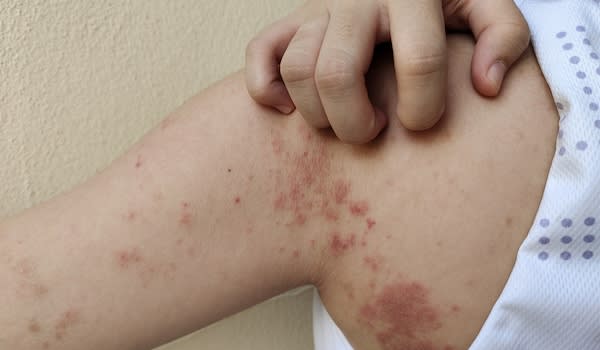Understanding hives: How long they last and how to treat them

[5 MIN READ]
In this article:
-
Hives are red, itchy bumps that usually resolve on their own. When they don’t go away, or they keep coming back, it’s time to see a doctor.
-
Having a cold is a common trigger for hives in infants and toddlers. With adults, hives are often due to stress.
-
When hives are chronic (more than six weeks), it can be difficult to find an exact trigger.
-
There are no natural treatments that have been proven to be effective in treating cases of hives.
Hives: How long they last and how to treat them
The word “histamine” doesn’t often come up in casual conversation. Yet, this chemical released by the skin is one of the main causes of a much more common word: hives.
While hives can definitely be bothersome, most often they’re not a serious health concern.
“Hives are a common problem that can affect roughly one in five people during their lifetime,” says Kevin Dooms, M.D., an allergy and immunology specialist at Providence Swedish Allergy and Immunology – Bellevue.
What are hives?
Hives are red, itchy bumps that can appear anywhere on your skin, sometimes randomly and without warning. They can begin at any age, and how long they last can vary.
“Most chronic hives (with or without swelling) eventually resolve on their own,” says Dr. Dooms, “but it's hard to know when. They can last from a few months to a few years. Unfortunately for a few patients, hives may last many years — even decades or a lifetime. When that happens, we focus our energy on controlling symptoms and sustaining quality of life.”
“Hives like to come and go,” adds Dr. Dooms. “One of the hallmarks of hives is that individual bumps will vanish after several minutes or hours. Unlike other rashes, hives don't stay in the same place. They move around like a game of Whac-A-Mole.”
Different types of hives
Hives can be chronic or acute. They usually appear in three ways:
- Urticaria – Inflamed, itchy, red welts or patches that occur on your skin
- Angioedema – Swollen areas similar to hives that occur under your skin, most often on your lips, eyes, hands, or feet
- Dermographia – Temporary hives that form after your skin has been scratched or rubbed (dermographia means “skin writing”)
Acute hives
Acute hives last for less than six weeks. They can be caused by viral infections (including the common cold), food allergies, medication allergies, environmental allergies or insect bites.
Recent infections that affect the immune system, such as cold viruses, are the most common causes of hives in infants and toddlers. Stress is a common trigger for adults.
Chronic hives
Hives are considered “chronic” when symptoms have lasted longer than six weeks. Chronic urticaria, or hives, can be unpredictable and may appear without a clear pattern.
The cause of hives that are chronic varies widely from person to person. “Chronic hives can be triggered by any number of things, like it’s too hot or too cold outside,” explains Dr. Dooms. “Despite what you may have been told or read on the internet, chronic hives are rarely due to an allergic reaction. They can appear for many reasons.”
Causes of chronic hives include:
- Unknown cause (aka “idiopathic” or “spontaneous”)
- Autoimmune issues
- Emotional stress
- Extreme heat or cold
- Exercise
- Hormonal changes
- Use of NSAIDs, such as aspirin, ibuprofen and naproxen
Treatment options for hives
Regardless of the type, most hives respond to the same treatment: inexpensive, over-the-counter antihistamines. Antihistamines are medications that block the effects of the chemical histamine, which causes the hives.
“A majority of hives and swelling cases will respond to over-the-counter oral antihistamines like Zyrtec, Allegra or their generic equivalents (cetirizine or fexofenadine),” says Dr. Dooms. “Allergists like myself are particularly useful to see for symptoms that persist in spite of antihistamines.”
The goal of hive medications is to improve quality of life: relief from itching, bumps and swelling. However, antihistamines and other hive treatments won’t cure your condition. Your doctor will work with you to develop a treatment plan that addresses your unique health history.
“Recurrent hives and swelling can be miserable, and are fundamentally a quality-of-life problem,” says Dr. Dooms. “Recurrent hives and swelling are seldom dangerous, and it is uncommon for there to be a serious underlying or life-threatening condition. Our goal is to find a medication regimen to make our patients comfortable so they can go on with their lives.”
Natural remedies
And what about natural remedies for hives?
“Many patients have predictable triggers like stress, hot or cold extremes, or exertion,” says Dr. Dooms. “We recommend avoiding these triggers as best as possible. I’m not aware of any supplements or ‘natural’ treatments that have been scientifically studied or recommended for this problem.”
When to see a doctor for hives
If hives last for more than a few days or lead to other symptoms, such as trouble breathing (also called anaphylaxis), it’s time to see a doctor. Another sign that something may be wrong is if the hives keep coming back. In this case, it may be better for you to see an allergist or dermatologist for medical advice and treatment rather than a primary care provider.
You should head to urgent care or the emergency department if you experience the following symptoms:
- Difficulty breathing or wheezing
- Loss of consciousness
- Rapid heart rate
- Swelling of the face, lips, tongue or throat
- Dizziness or fainting
When normal treatments for hives — such as antihistamines like Benadryl or Claritin — don’t work, it’s important that you ask for help so you can make sure you don’t have a serious health problem.
Contributing caregivers

Kevin Dooms, M.D., is an allergy and immunology specialist at Providence Swedish Allergy and Immunology – Bellevue.
Find a doctor
If you are looking for an allergy specialist or a primary care provider, you can find one who’s right for you in our provider directory. Through Providence Express Care Virtual, you can access a full range of health care services.
Download the Providence app
It’s all in the app: easily stay connected with Providence and your health. With the Providence app, you can schedule appointments, have virtual visits from the comfort of your home, get personalized health recommendations, access your health records and so much more. Learn more and download the app.
Related resources
What you need to know about food allergies
This information is not intended as a substitute for professional medical care. Always follow your health care professional’s instructions.